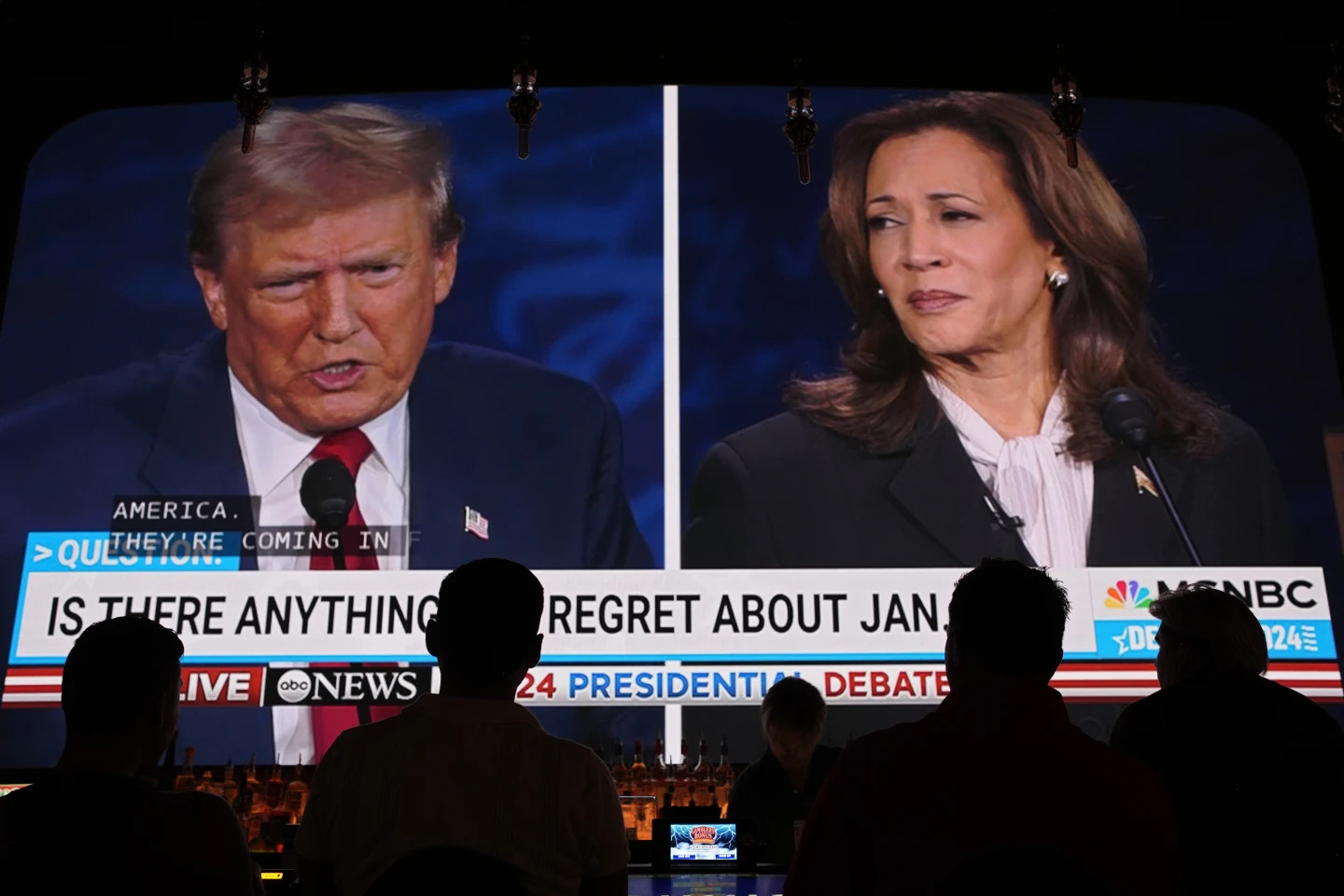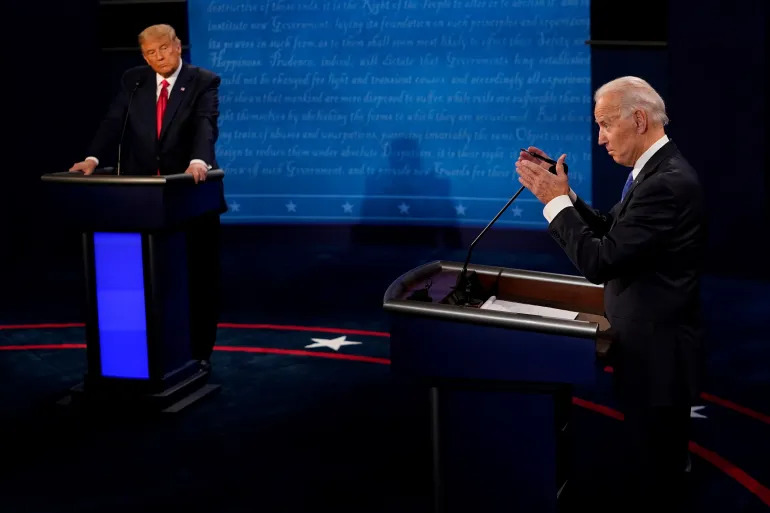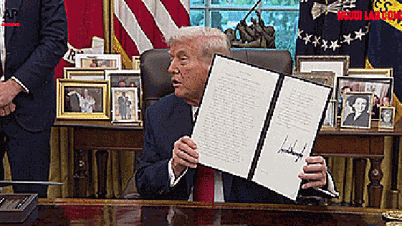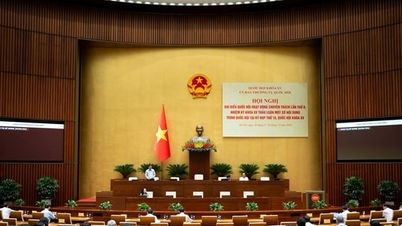And the question that was raised after the debate ended, which was judged to be somewhat in favor of Ms. Harris, was: Do presidential debates really matter and do they change voters' thoughts and decisions about the candidates?

People watch the debate between former Republican President Donald Trump and Democratic Vice President Kamala Harris on the evening of September 10. Photo: AP
Do presidential debates change election results?
Overall, research suggests the answer is largely no.
Harvard Business School associate professor Vincent Pons evaluated pre- and post-election surveys in 10 countries, including the US, UK, Germany and Canada, from 1952 (the year of the first televised presidential debate in the US) to 2017.
The results showed that televised debates had no significant impact on voters' choices. "Debates are where voters can find out what candidates stand for and how good they really are, but debates have no impact on any group of voters," Pons said.
Another analysis published in 2013 by University of Missouri communication professors Mitchell McKinney and Benjamin Warner looked at survey responses from college students from universities across the United States between 2000 and 2012.
They also found that presidential debates had little impact on voters' choices. 86.3% of respondents remained the same before and after watching the debate, and 7% were undecided. Only 3.5% changed their vote to another candidate. By the time the debates took place, most voters had already chosen a party, said Professor Daron Shaw of the University of Texas at Austin.
Meanwhile, in the two debates between Mr. Trump and Mr. Biden in 2020, 87% of voters surveyed said the debate did not affect their vote, according to a Monmouth University poll.
Polling analysis platform FiveThirtyEight showed Biden at 50.1% on September 28, 2020, and Trump at 43.2%. By September 30, after the debate, Biden was at 50.5% and Trump at 42.9%.
Likewise, the two candidates' poll numbers were virtually unchanged before and after the second debate. Mr. Biden won the 2020 election with 51.3% of the national popular vote and 306 Electoral College votes.

The final US presidential debate of 2020 at the Curb Events Center at Belmont University in Nashville, Tennessee, on October 22, 2020. Photo: Pool
Democratic candidate Hillary Rodham Clinton and Mr. Trump had three heated debates eight years ago.
The first debate took place on September 26, 2016. The two candidates sparred over everything from racism in America to Mr. Trump’s disparaging comments about beauty pageant winners. Mrs. Clinton was seen as being on the offensive, while Mr. Trump was on the defensive.
Most news reports the next day said Clinton had won the debate. But according to a 2016 FiveThirtyEight poll, the two candidates’ approval ratings were flat, with Trump even slightly in favor of Clinton. Clinton had 42.4% and Trump 40.5% on September 25. By September 27, Clinton had 42.5% to Trump’s 41%.
The second debate took place on October 9, but neither that nor the third debate on October 19 had much impact on the polls.
On election day, November 8, the result was that Mrs. Clinton won 48% of the popular vote compared to Mr. Trump's 46%, but Mr. Trump won more votes in the Electoral College, thereby winning under the indirect presidential election system in the US.
A large body of research shows that the main reason presidential debates typically don't have much of an impact on voters is because most voters who watch these televised spectacles already support a candidate.
But there are exceptions.
However, there are cases where debates increase the chances of certain candidates, such as the case of former President Barack Obama.
In the 2008 presidential race, Mr. Obama gained a significant advantage a few days after the first debate took place on September 26, 2008.
From September 9 to 14, the two candidates Obama of the Democratic Party and John McCain of the Republican Party had equal support rates in the polls. Mr. Obama had 46%, compared to Mr. McCain's 44%.
But after the debate on September 26, from September 27 to 29, Mr. Obama's approval rating jumped to 49%, while Mr. McCain's dropped to 42%.
Another example is the Biden-Trump debate in June, which, according to polling averages compiled by FiveThirtyEight, left President Joe Biden trailing former President Donald Trump by a small margin before the debate.
However, Mr. Biden had a forgettable performance in the debate, when he was not focused, his words were unclear and sometimes incoherent. Therefore, from June 27 to July 9, Mr. Trump widened the gap by 2%, reaching 42.1% support compared to Mr. Biden's 39.9%.
“That debate had a spectacular effect, essentially creating momentum to take Biden out of the race. It was a significant and very unusual event,” Shaw said.
In addition, debates can help undecided voters make their choice. Especially for candidates who are relatively unknown at the time, as was the case with Barack Obama in 2008 or John F Kennedy in 1960, debates can be crucial to their eventual victory.
Hoai Phuong (according to Al Jazeera)
Source: https://www.congluan.vn/bau-cu-my-2024-cac-cuoc-tranh-luan-co-lam-thay-doi-quyet-dinh-cua-cu-tri-khong-post312026.html


![[Photo] General Secretary To Lam receives US Ambassador to Vietnam Marc Knapper](https://vphoto.vietnam.vn/thumb/1200x675/vietnam/resource/IMAGE/2025/9/29/c8fd0761aa184da7814aee57d87c49b3)
![[Photo] Solemn opening of the 12th Military Party Congress for the 2025-2030 term](https://vphoto.vietnam.vn/thumb/1200x675/vietnam/resource/IMAGE/2025/9/30/2cd383b3130d41a1a4b5ace0d5eb989d)
![[Photo] General Secretary To Lam, Secretary of the Central Military Commission attends the 12th Party Congress of the Army](https://vphoto.vietnam.vn/thumb/1200x675/vietnam/resource/IMAGE/2025/9/30/9b63aaa37ddb472ead84e3870a8ae825)

![[Photo] General Secretary To Lam attends the ceremony to celebrate the 80th anniversary of the post and telecommunications sector and the 66th anniversary of the science and technology sector.](https://vphoto.vietnam.vn/thumb/1200x675/vietnam/resource/IMAGE/2025/9/29/8e86b39b8fe44121a2b14a031f4cef46)


































![[Photo] Many streets in Hanoi were flooded due to the effects of storm Bualoi](https://vphoto.vietnam.vn/thumb/1200x675/vietnam/resource/IMAGE/2025/9/29/18b658aa0fa2495c927ade4bbe0096df)
![[Photo] National Assembly Chairman Tran Thanh Man chairs the 8th Conference of full-time National Assembly deputies](https://vphoto.vietnam.vn/thumb/1200x675/vietnam/resource/IMAGE/2025/9/29/2c21459bc38d44ffaacd679ab9a0477c)






























































Comment (0)